Welcome to the 102nd edition of Trade War.
China pumps a record amount of credit into economy but consumer demand still weak. State agencies are investing in ever more private companies as overall enterprises age. And rich business people face rising risks.
Mandarin Oriental chief calls Hong Kong a “very poor” base for business. Identity of the Beijing Olympics mystery spectators is revealed. And new anonymous essay predicts Xi’s hubris will sabotage his political future.
China pumps credit but households not spending
China’s banks made record loans in January, part of Beijing’s efforts to boost flagging growth, but households continued to stay on the sidelines, reports Bloomberg News.
Banks made 3.98 trillion yuan ($626 billion) of new loans last month, the most going back to 1992, according to the People’s Bank of China. January typically sees a surge in lending.
“Authorities have pivoted toward stabilizing the economy after growth took a sharp downturn in the latter part of last year as a result of a property market slump and sporadic virus outbreaks,” reports the financial news service.
“Local governments have started to speed up bond sales to boost infrastructure spending, while the PBOC has cut interest rates and pushed banks to extend more loans,” says Bloomberg.
The surge in loans however is hiding weak consumer spending. Short-term household loans dropped for the third month in a row, from a year earlier. Medium and long-term household loans - mainly mortgages - fell for a second consecutive month as the housing market continues to suffer.
“We should not assume the upside surprise in January credit data will be quickly transformed into an upside surprise in economic performance,” said a note by Nomura Holdings economists.

State agencies investing in private firms
While China’s local governments have long supported private companies by providing tax breaks, loans and cheap land, now they are increasingly investing directly in the enterprises, reports Bloomberg News’ Tom Hancock.
According to research done by the University of Chicago, Tsinghua University and the University of Hong Kong, China’s more than 37 million registered companies are owned by 62 million private individuals, but also 40,000 state agencies, ranging from central level institutions down to village organizations, which often take stakes through state-owned companies.
“Companies owned by state agencies, most at the local-government level, have been increasing their partnerships with private companies. The average state stakeholder now invests in companies owned by almost 16 private owners, up from eight a decade ago,” reports the financial news service.
With the average number of owners per company unchanged, this shows that every state entity has nearly doubled the number of private enterprises it invests in, according to Chang-Tai Hsieh, a business professor at Chicago’s Booth School.
In 2019, of the 7,500 richest individuals owning businesses, over half had at least one company with a state shareholder. This creates companies that are “not fully state-owned firms but also not really private firms,” Hsieh says. “It’s this murky gray area, which I think is the dominant corporate structure in China today.”
“The distinction between state-owned and private has been important for policymakers outside China and for analyzing the Chinese economy,” says Meg Rithmire, a professor at Harvard Business School. “That boundary is eroding.”

China’s companies getting old
“Everyone knows China's population is aging, but turns out its population *of companies* is also getting older,” tweets Gavekal Dragonomics China research director Andrew Batson. “An interesting new IMF paper finds that "the share of firms under 10 years old fell from around 70 percent in 2003-04 to around 30 percent in 2017-18.”
“After impressive growth in the 2000s, largely driven by the rapid growth of young private firms, China’s productivity has more recently stagnated,” the IMF writes.
“Given looming demographic headwinds and diminishing returns to state-led investment, China’s medium and long-term growth prospects are set to become increasingly dependent on its ability to reignite productivity growth.”

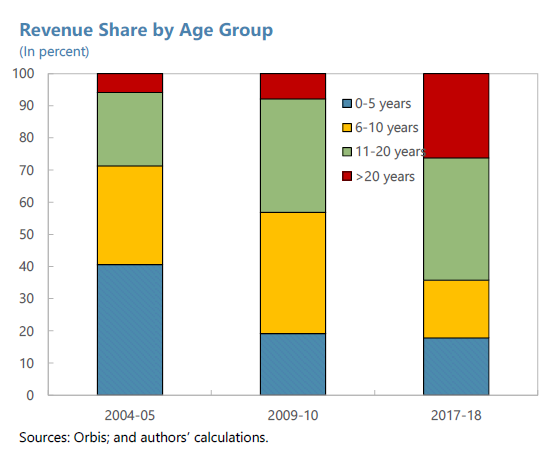
Making profit a party-granted privilege
Business people run an increasing risk of being caught up in anti-corruption campaigns and China’s opaque legal system, reports Bloomberg News’ Blake Schmidt.
Some 30,000 people are secretly detained in China each year, up 10-fold under Xi Jinping compared to the decade before he came to power in 2012, according to Madrid-based Safeguard Defenders, a rights group.
And while many of those detained are dissidents or activists, Beijing is increasingly focusing attention on wealth and business people, under its “Common Prosperity” program. China’s anticorruption agency pledged in January to “show no mercy” in its aim of breaking the ties between money and power.
“The Communist Party says it’s tackling corruption, anticompetitive behavior, and financial and security risks; critics say it’s reining in threats to its dominance,” writes Schmidt.
The party is demonstrating that “making profit is a privilege, not a right. Big tycoons can continue at the grace of the party,” Steve Tsang, director of SOAS University of London’s China Institute told Bloomberg.

Mandarin Oriental says Hong Kong ‘very poor’ base
The chief of the Mandarin Oriental luxury hotel group is considering temporarily moving company executives from Hong Kong, write the Financial Times’ Primrose Riordan and Chan Ho-him.
James Riley, the Mandarin Oriental’s chief executive told the Financial Times that Hong Kong’s extremely strict zero-Covid restrictions made the city a “very poor” base for operations.
“Increasingly, most of my key senior executives are now traveling or are outside Hong Kong. My chief operating officer, who’s based in Hong Kong, left 15 months ago. And I have no plan for him to come back because he can’t do anything here,” said Riley, a 25-year resident of Hong Kong.
“When the borders are shut, this is a strange place from which to operate. Because you can’t go and visit a hotel or visit a customer or visit a potential owner. You can’t go anywhere,” he said.

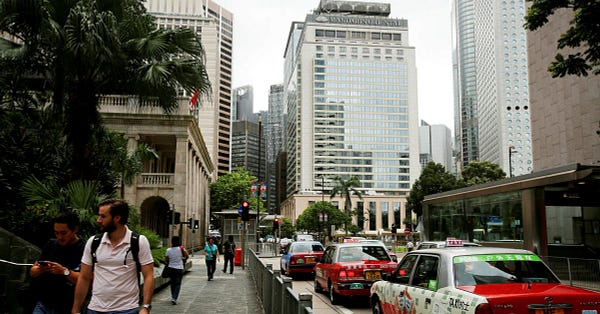
Xi, architect of his own defeat
As this fall’s 20th Party Congress approaches, a new anonymous essay has appeared attacking Xi Jinping and predicting his eventual downfall, writes translator Geremie R. Barmé.
“Political power struggles in the People’s Republic of China have an ineluctable rhythm. Every five to ten years the quotidian thrum of wrangling reaches a dramatic crescendo as the contention between individuals, factions and elites is focussed on the spoils of power,” writes Barmé.
“An Objective Evaluation of Xi Jinping,” a 40,000-character essay penned under the name Fang Zhou & China, is “the first public salvo in China’s 2022 ‘selection year’,” according to Barmé.
“At this historical juncture someone with a strong personality and formidable political skills—someone like Xi Jinping, in fact—was capable of dominating with considerable aplomb the Party nomenklatura. On top of that was Xi’s personality: he’s more ruthless than anyone else. That is to say, Xi Jinping took advantage of the limitations of his opponents as well as the Party as a whole and simply terrorized everyone into submission,” writes Fang Zhou & China.
“It is obvious that no individual or group within the Party can rein Xi Jinping in. Thus, Xi will be the architect of his own defeat. His style of governance is simply unsustainable; it will generate ever newer and greater policy missteps,” the essay predicts.
And Xi’s far more assertive approach towards other countries will help contribute to his downfall: “China has been in the process of integrating with the world for decades and no single individual can turn back the tide. The Communist Party simply won’t allow the vision of one man to engage in a new cold war with the rest of the world.”
“Over time, elites on both sides will collaborate and foment the kind of political crisis that will create a rift between Xi and the Party. Then he will be faced with mass disaffection and people piling on to bring him low. He will end up as a votive offering placed on the altar of political reconciliation,” writes Fang Zhou & China. “The chasm between Xi Jinping’s hubristic self-belief and stark reality is his Achilles heel.”

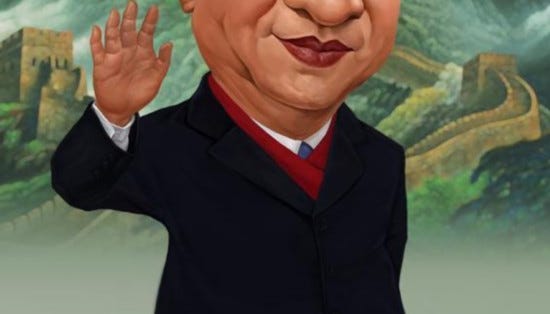
Sullivan to China: don’t give Russia a ‘wink and nod’
If China gives Russia a “wink and a nod or a green light” to invade Ukraine, they will face global consequences, said National Security Advisor Jake Sullivan in a recent press conference.
Beijing too will be unable to provide the economic support to make up for likely sanctions and export controls. “[The U.S. and its allies] are 50 percent-plus of global GDP, China and Russia are less than 20 percent,” says National Security Advisor Jake Sullivan. “We are well situated to be able to deal with any threat or challenge that would be posed to us by any autocracy in the world.”

Beijing Olympics’ mystery spectators
With most foreign and Chinese sports fans not allowed to attend the Beijing 2022 Winter Olympics, the audience in the stands instead is a combination of local and foreign VIPs and diplomats, report the Wall Street Journal’s Jin Yang and Liza Lin.
According to the event organizers, some 150,000 people who are being carefully screened for Covid are being allowed to the games in Beijing and Zhangjiakou, Hebei. That number will fill about one-half the total available seats for all Olympic events.
“The exact identity of those in attendance has been shrouded in some secrecy. Some employees at Chinese state-owned enterprises who have been invited were told that they must abide by confidentiality rules, refraining from posting on social media or discussing their attendance with outsiders without authorization,” the business paper reports.


Notable/In Depth
China’s long obsession with doing things on a huge scale is part of a “politics of grandeur” that has existed for thousands of years, reports the AP’s Stephen Wade.
“The idea is to give more to impress upon external audiences that we have so much to give you, that nobody else can compete with that,” Georgia State University’s Maria Repnikova told the news service.

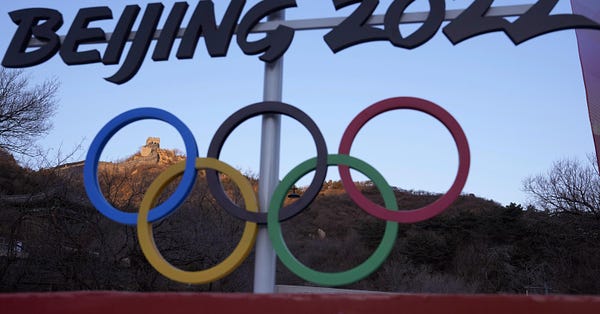
China’s family planners have announced their aim to “intervene” in abortions among unmarried women and teenagers, reports Sixth Tone’s Luo Meihan.


China must recognize that “the ‘sissy men’ & ‘otokonoko’ phenomena may cause some youth to avoid or fear normally falling in love, getting married and having children . . . impacting population growth,” writes a Chinese Academy of Social Sciences scholar.


“Here is my attempt to debunk in as little words yet as comprehensively as possible that A) there is no social credit score and B) a social credit score is not going to happen in the future either, writes MERIC’s analyst Vincent Brussee.


Beijing’s decisions to censor a report on U.S.-China decoupling “shows that economics and trade have also become hypersensitive in the political landscape that defines China today,” I say to Dagens Industri (in Swedish.)


"Socialist, capitalist, Leninist: what to call China? . . . For a one-word description of China’s system that is both analytically precise and historically accurate, 'Leninism' does the trick,"writes Gavekal Dragonomics’ Andrew Batson.

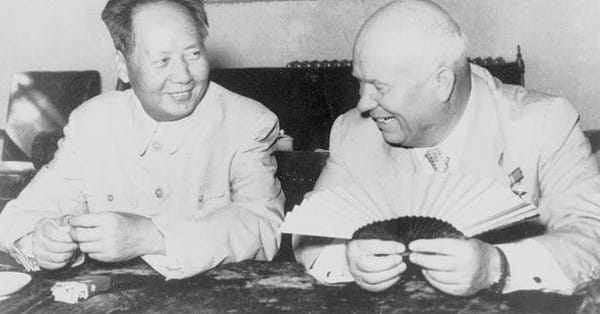
Chinese believe they should have the right to criticize their government, write CSIS scholars Illara Mazzocco and Scott Kennedy in a new report, “Public Opinion in China: a Liberal Silent Majority?”

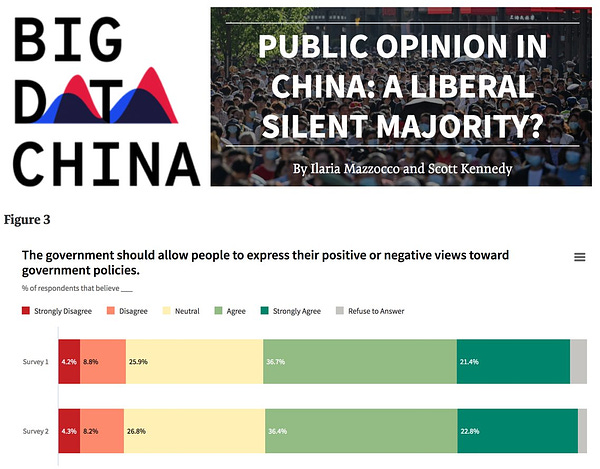
Swelling debt, decoupling and its shrinking population could end China’s goal of becoming the world’s largest economy, report Bloomberg News’ Eric Zhu and Tom Orlik.

Book event: ‘Today Hong Kong, Tomorrow the World’
Not one to miss: longtime journalist and writer Mark Clifford will be discussing his new book Today Hong Kong, Tomorrow the World, at the Overseas Press Club of America next Wednesday evening. Register in this link.


Montana, the Big Sky state
Montana living up to its reputation as the Big Sky state.

